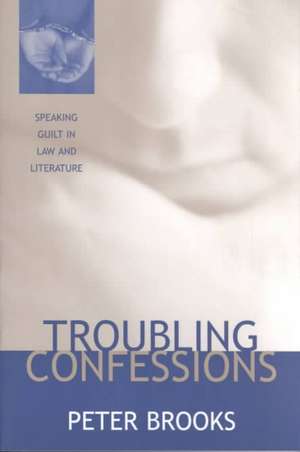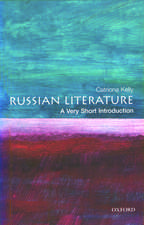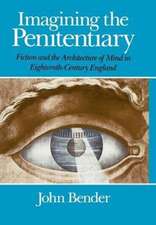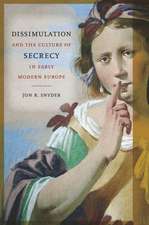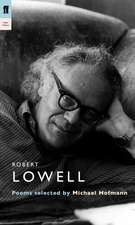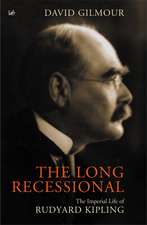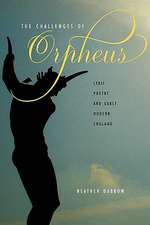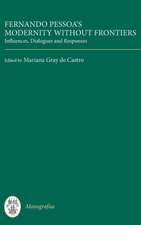Troubling Confessions: Speaking Guilt in Law and Literature
Autor Professor Peter Brooksen Limba Engleză Paperback – oct 2001
The constant call to admit guilt amounts almost to a tyranny of confession today. We demand tell-all tales in the public dramas of the courtroom, the talk shows, and in print, as well as in the more private spaces of the confessional and the psychoanalyst's office. Yet we are also deeply uneasy with the concept: how can we tell whether a confession is true? What if it has been coerced?
In Troubling Confessions, Peter Brooks juxtaposes cases from law and literature to explore the kinds of truth we associate with confessions, and why we both rely on them and regard them with suspicion. For centuries the law has considered confession to be "the queen of proofs," yet it has also seen a need to regulate confessions and the circumstances under which they are made, as evidenced in the continuing debate over the Miranda decision. Western culture has made confessional speech a prime measure of authenticity, seeing it as an expression of selfhood that bears witness to personal truth. Yet the urge to confess may be motivated by inextricable layers of shame, guilt, self-loathing, the desire to propitiate figures of authority. Literature has often understood the problematic nature of confession better than the law, as Brooks demonstrates in perceptive readings of legal cases set against works by Rousseau, Dostoevsky, Joyce, and Camus, among others.
Mitya in The Brothers Karamazov captures the trouble with confessional speech eloquently when he offers his confession with the anguished plea: this is a confession; handle with care. By questioning the truths of confession, Peter Brooks challenges us to reconsider how we demand confessions and what we do with them.
In Troubling Confessions, Peter Brooks juxtaposes cases from law and literature to explore the kinds of truth we associate with confessions, and why we both rely on them and regard them with suspicion. For centuries the law has considered confession to be "the queen of proofs," yet it has also seen a need to regulate confessions and the circumstances under which they are made, as evidenced in the continuing debate over the Miranda decision. Western culture has made confessional speech a prime measure of authenticity, seeing it as an expression of selfhood that bears witness to personal truth. Yet the urge to confess may be motivated by inextricable layers of shame, guilt, self-loathing, the desire to propitiate figures of authority. Literature has often understood the problematic nature of confession better than the law, as Brooks demonstrates in perceptive readings of legal cases set against works by Rousseau, Dostoevsky, Joyce, and Camus, among others.
Mitya in The Brothers Karamazov captures the trouble with confessional speech eloquently when he offers his confession with the anguished plea: this is a confession; handle with care. By questioning the truths of confession, Peter Brooks challenges us to reconsider how we demand confessions and what we do with them.
Preț: 203.97 lei
Nou
Puncte Express: 306
Preț estimativ în valută:
39.03€ • 40.75$ • 32.23£
39.03€ • 40.75$ • 32.23£
Carte tipărită la comandă
Livrare economică 15-29 aprilie
Preluare comenzi: 021 569.72.76
Specificații
ISBN-13: 9780226075860
ISBN-10: 0226075869
Pagini: 224
Ilustrații: Ill.
Dimensiuni: 152 x 229 x 16 mm
Greutate: 0.29 kg
Ediția:1
Editura: University of Chicago Press
Colecția University of Chicago Press
ISBN-10: 0226075869
Pagini: 224
Ilustrații: Ill.
Dimensiuni: 152 x 229 x 16 mm
Greutate: 0.29 kg
Ediția:1
Editura: University of Chicago Press
Colecția University of Chicago Press
Notă biografică
Peter Brooks is Chester D. Tripp Professor of Humanities and Director of the Whitney Humanities Center at Yale University. He is author of, most recently, Psychoanalysis and Storytelling and the novel World Elsewhere, and is co-editor of Law's Stories: Narrative and Rhetoric in the Law.
Cuprins
Acknowledgments
Introduction
1. Storytelling without Fear? The Confession Problem
2. Confessor and Confessant
3. The Overborne Will—A Case Study
4. Confession, Selfhood, and the Religious Tradition
5. The Culture of Confession, Therapy, and the Law
6. The Confessional Imagination
Notes
Index
Introduction
1. Storytelling without Fear? The Confession Problem
2. Confessor and Confessant
3. The Overborne Will—A Case Study
4. Confession, Selfhood, and the Religious Tradition
5. The Culture of Confession, Therapy, and the Law
6. The Confessional Imagination
Notes
Index
